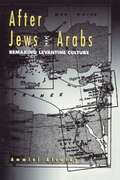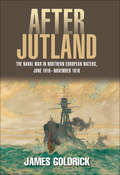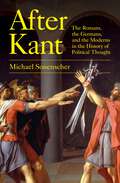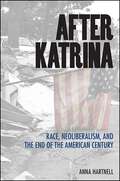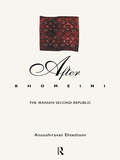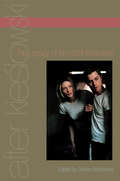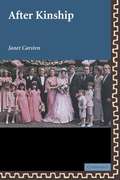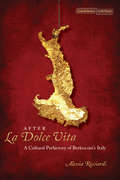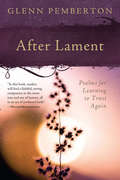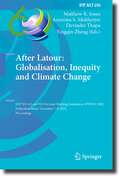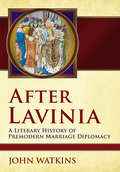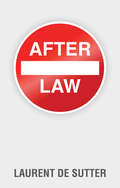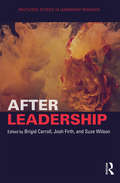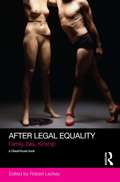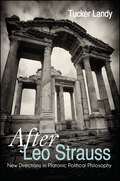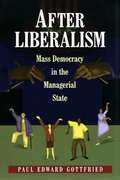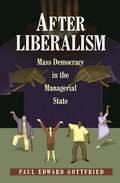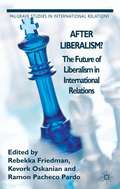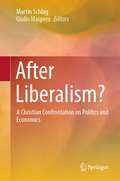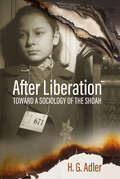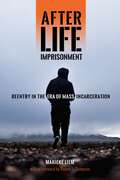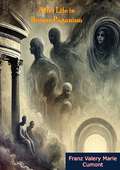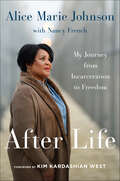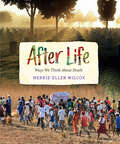- Table View
- List View
After Jews and Arabs: Remaking Levantine Culture
by Ammiel AlcalayThis book not only makes a significant contribution to the literature but, by breaking new ground, seeks to create a new frame of reference for further studies of the Mediterranean. The author has pulled together many strands of scholarship to present a view of the Middle East that is starkly at odds with that put forth in the establishment press and academic journals - while taking care not to sacrifice the erudition and research, whether literary critical, historical or linguistic, that have traditionally sanctioned the orientalists' version of Levantine history in the service of Western control over the region.
After Jihad: America and the Struggle for Islamic Democracy
by Noah FeldmanHow do we make democratic nations?
After Jutland: The Naval War in North European Waters, June 1916–November 1918
by James GoldrickThis is the story of the naval war in northern European waters following the critical if inconclusive battle of Jutland. There is a popular misconception that the battle marked the end of the operational career of the German High Sea Fleet. The reality is much more complex. The German battle fleet may have been quiescent in the North Sea, but it supported an ambitious amphibious campaign in the Baltic while an ever more bitter commerce war was waged by U-boats; and smaller warships of both sides fought a gruelling campaign in the waters of the English Channel and the Belgian Coast. While the book focuses primarily on the Royal Navy as the dominant maritime force, it also analyses the struggles of the beleaguered German Navy as it sought to find ways to break the tightening stranglehold of the Allied blockade. It includes an assessment of the small, but increasingly significant supporting role played by the French Navy from its bases in northern France, while the continuing conflict in the Baltic is explored as the Germans increased pressure on Russian territory and the Russian fleet, despite the descent into revolution, still managed to strike heavy blows at the Imperial German Navy. This period was one of great change. The Royal Navy improved the way that ships and their crews were organised for battle, and there were great leaps in communications and in command and control; aviation and undersea operations, including mine warfare, developed at breakneck pace. Both Germany and Russia undertook far more naval innovation and technological development in the final years of the War than is often realised, and by 1918 the protagonists were fighting what was, in every way, a multi-dimensional maritime war – the forerunner of the form of naval conflict of the remainder of the twentieth century. The author deals with the entry into the conflict of the United States and the increasing commitment of the US Navy to operations in Northern European waters. Many of the foundations of success in the next war were laid by the USN at this time, and there are strong links between the performance of all the navies and their experiences in 1939–45. Not only were doctrine and technology shaped by the events of the First War, so were the cultures of the various services and the characters of the individuals who would go on to serve in the highest ranks in the next. All of this makes the 1916-18 period so significant in naval history. In addition to his huge historical knowledge, the author brings his own extensive personal experience of naval operations and command at sea to this study, and this fusion of history with practical understanding sheds a unique and fascinating perspective on his analysis of the conflict.
After Kant: The Romans, the Germans, and the Moderns in the History of Political Thought
by Michael SonenscherTracing the origins of modern political thought through three sets of arguments over history, morality, and freedomIn this wide-ranging work, Michael Sonenscher traces the origins of modern political thought and ideologies to a question, raised by Immanuel Kant, about what is involved in comparing individual human lives to the whole of human history. How can we compare them, or understand the results of the comparison? Kant’s question injected a new, future-oriented dimension into existing discussions of prevailing norms, challenging their orientation toward the past. This reversal made Kant’s question a bridge between three successive sets of arguments: between the supporters of the ancients and moderns, the classics and romantics, and the Romans and the Germans. Sonenscher argues that the genealogy of modern political ideologies—from liberalism to nationalism to communism—can be connected to the resulting discussions of time, history, and values, mainly in France but also in Germany, Switzerland, and Britain, in the period straddling the French and Industrial revolutions.What is the genuinely human content of human history? Everything begins somewhere—democracy with the Greeks, or the idea of a res publica with the Romans—but these local arrangements have become vectors of values that are, apparently, universal. The intellectual upheaval that Sonenscher describes involved a struggle to close the gap, highlighted by Kant, between individual lives and human history. After Kant is an examination of that struggle’s enduring impact on the history and the historiography of political thought.
After Katrina: Race, Neoliberalism, and the End of the American Century
by Anna HartnellThrough the lens provided by the tenth anniversary of Hurricane Katrina, After Katrina argues that the city of New Orleans emerges as a key site for exploring competing narratives of US decline and renewal at the beginning of the twenty-first century. Deploying an interdisciplinary approach to explore cultural representations of the post-storm city, Anna Hartnell suggests that New Orleans has been reimagined as a laboratory for a racialized neoliberalism, and as such might be seen as a terminus of the American dream. This US disaster zone has unveiled a network of social and environmental crises that demonstrate that prospects of social mobility have dwindled as environmental degradation and coastal erosion emerge as major threats not just to the quality of life but to the possibility of life in coastal communities across America and the world. And yet After Katrina also suggests that New Orleans culture offers a way of thinking about the United States in terms that transcend the binary of national renewal or declension. The post-Hurricane city thus emerges as a flashpoint for reflecting on the contemporary United States.
After Khomeini: The Iranian Second Republic
by Anoushiravan EhteshamiFor Iran the years since Ayatollah Khomeini's death have been dominated by the need for political consolidation and economic reconstruction.The book assesses the critical dilemmas of the regime both previous to and since the demise of its first spiritual leader. The vital issues of political succession and constitutional reform are addressed, contributing to an analysis of the structures and politics of power. How these have reflected upon economic policy is considered with close atttention being given to the reform policies of Rafsanjani. Foreign policy and security issues are discussed in both regional and global terms and include a study of Iranian defence strategy and its controversial re-armament drive.The final chapter examines the direction and context of all of these major policy areas, providing an analysis of whether the Islamic Republic truly represents a revolutionary alternative for the Third World or whether in fact it has developed in time to fall within a similar mould to other notable revolutions, casting by the wayside any uniquely Islamic agenda and alternatives.At the heart of this study is the belief that the Islamic regime has, since the cease-fire with Iraq, but more specifically since Ayatollah Khomeini's death passed into a new stage of development, referred to in the book as the `Second Republic'.
After Kieślowski: The Legacy of Krzysztof Kieślowski
by Steven WoodwardTraces the legacy of Krzysztof Kieslowski in films made after his death using his scripts or ideas and in the work of other filmmakers.
After Kinship
by Janet CarstenAfter Kinship examines what has happened to kinship through various tropes: the house, gender, personhood, substance, and reproductive technologies. It is s much about what has happened to the anthropological study of kinship in recent years as it is about what has happened to our everyday experience of kinship.
After La Dolce Vita: A Cultural Prehistory of Berlusconi's Italy
by Alessia RicciardiThis book chronicles the demise of the supposedly leftist Italian cultural establishment during the long 1980s. During that time, the nation's literary and intellectual vanguard managed to lose the prominence handed it after the end of World War II and the defeat of Fascism. What emerged instead was a uniquely Italian brand of cultural capital that deliberately avoided any critical questioning of the prevailing order. Ricciardi criticizes the development of this new hegemonic arrangement in film, literature, philosophy, and art criticism. She focuses on several turning points: Fellini's futile, late-career critique of Berlusconi-style commercial television, Calvino's late turn to reactionary belletrism, Vattimo's nihilist and conservative responses to French poststructuralism, and Bonito Oliva's movement of art commodification, Transavanguardia.
After Lament: Psalms for Learning to Trust Again
by Glenn PembertonJust as the Book of Psalms provides the words we need for lament (expressing our grief and hurt to God), the Psalter also provides the guidance and language we need for negotiating the time after lament (learning to trust and give thanks).Nearly half of the psalms in the Book of Psalms are "laments," expressions of grief, trouble, and suffering combined with calls for God's help. Glenn Pemberton's earlier book, Hurting with God, describes how the lament psalms helped him express his heart honestly before God. In After Lament, he masterfully explores the next stage of thejourney, pointing out that lament does not always lead to thanksgiving. What happens when God does not answer our lament? In this rich book, Pemberton draws our attention to psalms of trust. How do we learn to trust God "after lament"?Even if God's answer to our lament was "yes," we cannot return to our life before the storm. Scars remain. And should God's answer to our lament be something other than we wanted, we have an even greater faith challenge. How do we live with a God who said "no" in our moment of greatest need? Focusing on the psalms of trust, this book shows the Bible's answer to this question.
After Latour: IFIP WG 8.2 and WG 9.4 Joint Working Conference, IFIPJWC 2023, Hyderabad, India, December 7–8, 2023, Proceedings (IFIP Advances in Information and Communication Technology #696)
by Matthew R. Jones Yingqin Zheng Arunima S. Mukherjee Devinder ThapaThis book constitutes the refereed proceedings of the IFIP WG 8.2 and WG 9.4 Joint Working Conference on After Latour: Globalisation, Inequity and Climate Change, IFIPJWC 2023, held in Hyderabad, India, during December 7–8, 2023. The 15 full papers presented together with 13 short papers were carefully reviewed and selected from 60 submissions. They are organized in topical sections as follows: climate change and digital sustainability; ICT’s and sustainable development; IS in the education sector; privacy, trust, and surveillance; theories and methods.
After Lavinia: A Literary History of Premodern Marriage Diplomacy
by John WatkinsThe Renaissance jurist Alberico Gentili once quipped that, just like comedies, all wars end in a marriage. In medieval and early modern Europe, marriage treaties were a perennial feature of the diplomatic landscape. When one ruler decided to make peace with his enemy, the two parties often sealed their settlement with marriages between their respective families. In After Lavinia, John Watkins traces the history of the practice, focusing on the unusually close relationship between diplomacy and literary production in Western Europe from antiquity through the seventeenth century, when marriage began to lose its effectiveness and prestige as a tool of diplomacy.Watkins begins with Virgil's foundational myth of the marriage between the Trojan hero Aeneas and the Latin princess, an account that formed the basis for numerous medieval and Renaissance celebrations of dynastic marriages by courtly poets and propagandists. In the book's second half, he follows the slow decline of diplomatic marriage as both a tool of statecraft and a literary subject, exploring the skepticism and suspicion with which it was viewed in the works of Spenser and Shakespeare. Watkins argues that the plays of Corneille and Racine signal the passing of an international order that had once accorded women a place of unique dignity and respect.
After Law
by Laurent de SutterLaw is the most sacred fetish of our time. From radicals to conservatives, there is no militant, activist or thinker who would consider doing without it. But the history of our fascination with law is long and complex, and reaches deeper into our culture than we might think. In After Law, Laurent de Sutter takes us on a journey to uncover the sources of our fascination. He shows that at a certain moment in our history a choice was made to treat law as a decisive feature of civilization, but this choice was neither obvious nor necessary. Other political, social, religious or cultural possibilities could have been chosen instead – from ancient Egypt to Mesopotamia, from medieval Japan to China, from Islam to Judaism, other cultures have devised sophisticated tools to help people live together without having to deal with norms, rules and principles. This is a lesson worth reflecting on, especially at a time when the rule of law and the functioning of justice are increasingly showing their sinister side – and their impotence. Is there life beyond law?
After Leadership (Routledge Studies in Leadership Research)
by Brigid Carroll Suze Wilson Josh FirthLeadership studies today resembles a bewildering diversity of theories, concepts, constructs and approaches, struggling in huge part for meaning, relevance and impact. As Dennis Tourish so eloquently puts it, much of the literature suffers from ‘unrelenting triviality’ and ‘sterile preoccupations’. Seeking to create a clean break from this current state of leadership studies, After Leadership begins with the premise of a post-apocalyptic world where only fragments of ‘leadership science’ now remain, echoing Alisdair McIntyre’s imagining of such a scene as the basis for re-establishing the foundations and focus of moral theory. From these fragments, the authors seek to construct a new leadership studies that challenges much of the established thinking on leadership, exposes its limitations and biases, and, most importantly, seeks to construct the foundations of a more inclusive, participatory, bold, relational and social platform for leadership in the future. After Leadership thus imagines a brave new world where what leadership is and what we seek from it can be developed anew, rather than remaining bound up in the problematic traditions and preoccupations that characterise leadership studies today. Offering both full length chapter explorations that explore new ways of understanding and practicing leadership, as well as shorter essays that aim to provoke further reflection on leadership and what we seek of it, After Leadership offers a uniquely critical and creative collection that will inspire students, scholars and leadership educators to reconsider their understanding and practice of leadership.
After Legal Equality: Family, Sex, Kinship (Social Justice)
by Robert LeckeyGroups seeking legal equality often take a victory as the end of the line. Once judgment is granted or a law is passed, coalitions disband and life goes on in a new state of equality. Policy makers too may assume that a troublesome file is now closed. This collection arises from the urgent sense that law reforms driven by equality call for fresh lines of inquiry. In unintended ways, reforms may harm their intended beneficiaries. They may also worsen the disadvantage of other groups. Committed to tackling these important issues beyond the boundaries that often confine legal scholarship, this book pursues an interdisciplinary consideration of efforts to advance equality, as it explores the developments, challenges, and consequences that arise from law reforms aiming to deliver equality in the areas of sexuality, kinship, and family relations. With an international array of contributors, After Legal Equality: Family, Sex, Kinship will be an invaluable resource for those with interests in this area.
After Leo Strauss: New Directions in Platonic Political Philosophy (SUNY series in the Thought and Legacy of Leo Strauss)
by Tucker LandyFew thinkers of the twentieth century studied the fundamental questions of ethics and politics, or penetrated further into the philosophical sources of the moral relativism of our times, more deeply than Leo Strauss. After Leo Strauss is not yet another attempt to explicate, critique, or defend Strauss. Instead, it encourages us to look in new directions, and to escape certain aspects of Strauss's powerful influence, in order to revisit classic texts and make our own judgments about what those texts might mean. Tucker Landy proposes a post-Straussian reading of the Platonic dialogues that is non-esoteric yet respectful of their subtle dramatic-pedagogic form and urges us, in a spirit of Socratic humility, to reexamine ancient and modern theories of natural right to seek possible grounds for reconciliation between them. Landy puts forth a Socratic theory of democratic liberalism as an example of such reconciliation.
After Liberalism: Mass Democracy in the Managerial State
by Paul Edward GottfriedIn this trenchant challenge to social engineering, Paul Gottfried analyzes a patricide: the slaying of nineteenth-century liberalism by the managerial state. Many people, of course, realize that liberalism no longer connotes distributed powers and bourgeois moral standards, the need to protect civil society from an encroaching state, or the virtues of vigorous self-government. Many also know that today's "liberals" have far different goals from those of their predecessors, aiming as they do largely to combat prejudice, to provide social services and welfare benefits, and to defend expressive and "lifestyle" freedoms. Paul Gottfried does more than analyze these historical facts, however. He builds on them to show why it matters that the managerial state has replaced traditional liberalism: the new regimes of social engineers, he maintains, are elitists, and their rule is consensual only in the sense that it is unopposed by any widespread organized opposition. Throughout the western world, increasingly uprooted populations unthinkingly accept centralized controls in exchange for a variety of entitlements. In their frightening passivity, Gottfried locates the quandary for traditionalist and populist adversaries of the welfare state. How can opponents of administrative elites show the public that those who provide, however ineptly, for their material needs are the enemies of democratic self-rule and of independent decision making in family life? If we do not wake up, Gottfried warns, the political debate may soon be over, despite sporadic and ideologically confused populist rumblings in both Europe and the United States.
After Liberalism: Mass Democracy in the Managerial State (New Forum Books #25)
by Paul Edward GottfriedIn this trenchant challenge to social engineering, Paul Gottfried analyzes a patricide: the slaying of nineteenth-century liberalism by the managerial state. Many people, of course, realize that liberalism no longer connotes distributed powers and bourgeois moral standards, the need to protect civil society from an encroaching state, or the virtues of vigorous self-government. Many also know that today's "liberals" have far different goals from those of their predecessors, aiming as they do largely to combat prejudice, to provide social services and welfare benefits, and to defend expressive and "lifestyle" freedoms. Paul Gottfried does more than analyze these historical facts, however. He builds on them to show why it matters that the managerial state has replaced traditional liberalism: the new regimes of social engineers, he maintains, are elitists, and their rule is consensual only in the sense that it is unopposed by any widespread organized opposition. Throughout the western world, increasingly uprooted populations unthinkingly accept centralized controls in exchange for a variety of entitlements. In their frightening passivity, Gottfried locates the quandary for traditionalist and populist adversaries of the welfare state. How can opponents of administrative elites show the public that those who provide, however ineptly, for their material needs are the enemies of democratic self-rule and of independent decision making in family life? If we do not wake up, Gottfried warns, the political debate may soon be over, despite sporadic and ideologically confused populist rumblings in both Europe and the United States.
After Liberalism?
by Kevork Oskanian Rebekka Friedman Ramon Pacheco PardoIn this collection, leading international scholars provide their perspectives on the continuing role of the liberal paradigm, both as a theoretical approach to international relations, and as an ordering principle of international politics.
After Liberalism?: A Christian Confrontation on Politics and Economics
by Martin Schlag Giulio MasperoThe economic downturn caused by the COVID-19 pandemic, the unrest in the US following the unlawful death of George Floyd, and other sources of social unrest and insecurity, have brought to a head something that has been brewing in Western societies since the Great Recession of 2008: the disillusionment with liberal democracy as it evolved after World War II. Liberal political systems were characterized by a working compromise between capital and labor, between liberalism and socialism. This book analyzes how, and to what extent, the rise of populism and “identitarian” political movements, as well as the acceptance of world leaders who embody an authoritarian style of government, has undermined this compromise. Written by scholars from various disciplines, all of which share the Christian faith, it offers a snapshot of an intellectual debate among Christians who are deeply concerned about the world they live in, and who share their constructive proposals for a way forward after “liberalism as we know it.” The contributors address topics such as Christian alternatives to liberalism and populism, challenges to post-liberalism, trans-liberalism, and relational anthropology. Accordingly, the book will appeal to scholars who wish to reflect on the order of our society, and to anyone who shares the view that it is high time to rethink liberalism.
After Liberation: Toward a Sociology of the Shoah<br/>Selected Essays
by H. G. Adler Jeremy AdlerH.G. Adler (1910–1988) was one of the founding figures of Holocaust scholarship whose monumental monograph Theresienstadt 1941-1945. The Face of a Coerced Community (1955; 1960) was the first study to present a fully documented account of the Final Solution. This collection gathers together, for the first time in English, some of Adler’s most important scholarly essays on the Shoah and connected themes. Ideas raised for the first time in his book on Theresienstadt are here taken up and developed at greater length, new accents are set, and new themes are explored. Spanning his thought across three decades they focus on the fate of the ‘coerced’ human being and reflect on freedom, enslavement, terror, concentration camps, persecution, the mass society, dread, loneliness, and ideology.
After Life Imprisonment: Reentry in the Era of Mass Incarceration (New Perspectives in Crime, Deviance, and Law #13)
by Marieke LiemOne out of every ten prisoners in the United States is serving a life sentence—roughly 130,000 people. While some have been sentenced to life in prison without parole, the majority of prisoners serving ‘life’ will be released back into society. But what becomes of those people who reenter the everyday world after serving life in prison?In After Life Imprisonment, Marieke Liem carefully examines the experiences of “lifers” upon release. Through interviews with over sixty homicide offenders sentenced to life but granted parole, Liem tracks those able to build a new life on the outside and those who were re-incarcerated. The interviews reveal prisoners’ reflections on being sentenced to life, as well as the challenges of employment, housing, and interpersonal relationships upon release. Liem explores the increase in handing out of life sentences, and specifically provides a basis for discussions of the goals, costs, and effects of long-term imprisonment, ultimately unpacking public policy and discourse surrounding long-term incarceration. A profound criminological examination, After Life Imprisonment reveals the untold, lived experiences of prisoners before and after their life sentences.
After Life in Roman Paganism
by Franz Valery Marie CumontAfter Life in Roman Paganism by Franz Valery Marie Cumont is a pioneering exploration of Roman beliefs about the soul, death, and the afterlife, offering deep insights into the spiritual and philosophical worldview of the ancient Roman world. Originally published in the early 20th century, Cumont’s work draws upon archaeological evidence, literary texts, and religious practices to paint a comprehensive picture of how Romans imagined the fate of the soul after death.The book delves into the complex tapestry of Roman religious traditions, highlighting how pagan views of the afterlife evolved over centuries through interactions with Greek philosophy, Eastern mystery cults, and local Italic practices. Cumont examines Roman funerary customs, beliefs in the underworld, and the notion of an immortal soul, providing readers with a nuanced understanding of how these ideas shaped both personal piety and public rituals. The influence of Stoicism, Epicureanism, and Platonism on Roman attitudes toward death is also explored, showing the interplay between philosophy and religious belief in everyday life.Cumont’s analysis goes beyond simple descriptions, investigating the emotional and psychological dimensions of these beliefs. He reflects on how Roman society used myths and rituals to cope with the uncertainties of death, offering comfort and meaning to the living. His work also highlights the gradual transition from traditional pagan beliefs to the rise of Christianity, providing a glimpse into the cultural shifts that accompanied the fall of the Roman Empire.For readers interested in ancient religion, philosophy, or the history of Roman civilization, After Life in Roman Paganism remains a landmark study. Cumont’s scholarship offers not just an account of religious practices but also a profound exploration of the human quest for meaning in the face of mortality—a quest that resonates across time and cultures.
After Life: My Journey from Incarceration to Freedom
by Nancy French Alice Marie JohnsonForeword by Kim Kardashian WestThe true-life story of the woman whose life sentence for non-violent drug trafficking was commuted by President Donald Trump thanks to the efforts of Kim Kardashian West—an inspiring memoir of faith, hope, mercy, and gratitude.How do you hold on to hope after more than twenty years of imprisonment? For Alice Marie Johnson the answer lies with God.For years, Alice lived a normal life without a criminal record—she was a manager at FedEx, a wife, and a mother. But after an emotionally and financially tumultuous period in her life left her with few options, she turned to crime as a way to pay off her mounting debts. Convicted in 1996 for her nonviolent involvement in a Memphis cocaine trafficking organization, Alice received a life sentence under the mandatory sentencing laws of the time. Locked behind bars, Alice looked to God. Eventually becoming an ordained minister, she relied on her faith to sustain hope over more than two decades—until 2018, when the president commuted her sentence at the behest of Kim Kardashian West, who had taken up Alice’s cause.In this honest, faith-driven memoir, Alice explains how she held on to hope and gave it to others, from becoming a playwright to mentoring her fellow prisoners. She reveals how Christianity and her unshakeable belief in God helped her persevere and inspired her to share her faith in a video that would go viral—and come to the attention of celebrities who were moved to action.Today, Alice is an icon for the prison reform movement and a humble servant who embraces gratitude and God for her freedom. In this powerful book, she recalls all of the firsts she has experienced through her activism and provides an authentic portrait of the crisis that is mass incarceration. Linking social justice to spiritual faith, she makes a persuasive and poignant argument for justice that transcends tribal politics. Her story is a beacon in the darkness of despair, reminding us of the power of redemption and the importance of making second chances count.After Life features 16 pages of color photographs.
After Life: Ways We Think About Death
by Merrie-Ellen WilcoxWhy do we die? Why can't we live forever? What happens to us after death? Moving between science and culture, After Life: Ways We Think About Death takes a straightforward look at these and other questions long taboo in our society. <P><P>By showing the fascinating, diverse ways in which we understand death, both today and throughout our history, the book also shines a light on what it is to be human. Each chapter includes a brief telling of a death legend, myth or history from a different culture or tradition, from Adam and Eve to Wolf and Coyote, and ends with a section on a common theme in our thinking about death, such as rivers and birds in the afterlife, the colors that different cultures use to symbolize death, and, of course, ghosts. The final chapter is about grief, which is both a universal human experience and unique to each person. The text offers suggestions for ways to think about our grief, when to ask for help and how to talk to friends who are grieving.
